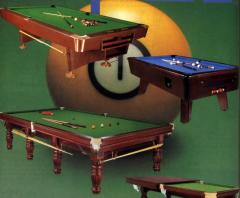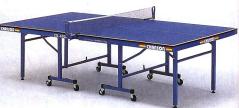Sophisticated Products Keep Makers in the Game
Indoor Sports Equipment
|
Due to chronic labor shortages, Taiwan's sporting-goods companies have quickly progressed from labor-intensive to automated manufacturing for many product lines. Nevertheless, to meet the demand for labor (which is still required in the manufacturing process for many sporting-goods products) the ROC government has permitted investments in mainland China, the import foreign laborers, and has eased restrictions on the import of mainland- made parts and semi-finished products. The ROC government has also lowered import tariffs to enable the island to join the World Trade Organization (WTO), as well as granting favorable tax incentives to help local manufacturers upgrade quality and create higher unit-priced products. |
| For traditional sporting-goods items, manufacturers often conduct business by finalizing contracts and conducting negotiations in Taiwan, and then ship their finished products directly from factories in Southeast Asia or mainland China. Products that are still manufactured on the island are either high value-added, new designs, or high-fashion items. "In the eighth sports product category [indoor sports items] assigned by the Taiwan Sporting Manufacturers Association (TSMA)," George Wood, Taipei Billiard Supply Co. president, says, "billiard, table-tennis, and darts equipment are Taiwan makers' most competitive items." According to Wood, Taiwan makers (including their overseas facilities) account for at least 80% of the global production value in the billiard-equipment industry. The island is also the world's largest producer of dart-game products. Wood adds that Taiwan table-tennis makers are gaining rapidly on Hong Kong trading firms that deal in such products, the current leaders in this line. |
| According to the ROC Director General of Customs statistics, the export values of billiard and table-tennis equipment shipped from Taiwan makers were US$20.17 million and US$1.38 million, respectively, in 1998. The former decreased 9% and the latter 29.7% from previous year. TSMA officials attribute the decrease to last year's financial storm in Asia. |
|
High-tech Cues
|
| Founded in 1980, Taipei Billiard Supply Co. (TBS) has become one of the top-500 corporations in Taiwan (No. 248). In 1990, TBS became the island's No. 1 exporter of billiard tables, cues, and related accessories, a position which it has retained up to now. In recent years, TBS has developed cues made in carbon-fiber. "Our carbon-fiber cues have initiated a new trend in international market," TBS president George Wood says. "The prices of such products are 30% to 50% higher than traditional wooden cues, and they have become one of our mainstream items." |
| "To overcome customer concerns about the relative high price of carbon-fiber cues, we constantly improve our products," Wood says. "For example, we have inserted iron cubes into the end section of our cues to add weight and provide a solid feeling to the product." (Carbon-fiber is extremely lightweight.) |
| TBS produces about a million cues annually. "But sometimes the demand is much larger," Wood says. "For example, we recently received a large order from U.S. cigarette-maker Marlboro. We produced 1.2 million cues within eight months (included cue cases) for Marlboro as a part of its sales promotion project. Our unprecedented fast-delivery earned us a global reputation as well as a new market sector." |
| About six years ago, TBS introduced its multi-function billiard tables, which include a number of game possibilities, to the market. "Since that time," notes Wood, "a billiard table has no longer simply been a space-occupying and single-function table, but has become a game center that provides various games such as darts, mini-basketball, table tennis, mini-bowling, and other games." |
| "The multi-purpose billiard table is a very competitive product," Wood says, "not only because of its numerous entertaining functions but also its affordable prices [less than professional billiard tables]. We sell about 400,000 of these types of tables per year, accounting for over 60% of the production volume of all of Asia for multi-function billiard tables." |
| TBS also operates as an integrated trading company for all kinds of billiard equipment and accessories, and for fitness equipment. To explain his ever-expanding business, Wood says, "the secret is our market analysis. We collect information regarding customer demands, especially in the U.S. market, and develop at least eight new products in different categories every year. There is absolutely no company that can rival us in this practice." |
| TBS exports all of its products to such markets as the U.S. (over 40%), Europe (20%), as well as Africa, Japan, and Russia. According to Wood, the Japanese and Russian markets have been growing the fastest in recent years. |
| Wood indicates that "Taiwan billiard-equipment makers, including their facilities in mainland China, account for over 80% of the world's market. Brand is not an important factor for billiard players, thereby increasing opportunities for Taiwan makers in the line." Table tennis is a minor but growing product line among Taiwan's indoor sporting-goods exports. The island's few manufacturers (about three) in this line have traditionally focused on the domestic market. Recently, though, they have begun to develop overseas markets. |
|
Innovative Designs
|
| Chanson Sporting Goods Co., established some 23 years ago, is the largest table tennis and billiard table maker in Taiwan. Sold under the Chanson brand name, the company's International Table Tennis Federation (ITTF)-approved tables have won the trust of Taiwan's users. |
| The ISO-9002 certified company began to explore overseas markets about five years ago. "The development of export markets is essential for business expansion," the company's sales manager, Luke Lo, says. "We have found that innovative designs are a key factor for enhancing product appeal worldwide." |
| About two years ago, Chanson started to use new kinds of materials for the table-tennis table surfaces. According to Lo, traditional table-tennis tables are made with medium-density fiberboard (MDF). MDF can not be perfectly waterproofed no matter how the table surface is processed. The new material Chanson uses on its table surfaces, Lo claims, is "totally waterproof and provides much better ball bounce force than MDF-surfaces." |
| "Though the new materials cost is higher than the MDF," Lo says, "we save on labor costs because they do not need further processing. The bounce-back force of an MDF table depends on its surface processing techniques. To make international-standard tables with MDF, a maker must invested heavily in table surface processing equipment. If the labor costs are taken into account, the costs of using the imported materials are almost equivalent to using MDF. Yet, the new tables can be sold at a higher price." |
|
Chanson has established sales channels in some Southeast-Asian countries, Japan,
and mainland China. "We compete with our international-standard quality rather
than with low price," Lo claims. "Mainland China is a massive market with massive
potential, but high tariffs and freight costs are major obstacles to the entry
of Taiwan-made table-tennis and billiard tables. In general, Taiwan-made tables
are much better in quality than those from mainland counterparts, but demand is
limited due to the tables' high prices. So, currently professional users there
are our major customers." To diversify its product categories, Chanson has also developed multifunction billiard tables. "Adding functions is a good way to enhance the appeal of a billiard table," Lo says. "Hot sales for us have resulted in the Japanese market." |
|
Target' Markets
|
| "Such multifunctional tables are mostly for residential use because Japanese residential apartment are usually quite small," Lo says. "Some models combine billiard and table-tennis tables into one item. Some can be also used as conference tables and some are foldable." Pai Li Business Co. is the largest dart-game maker in Taiwan. Thanks to Taiwan's well-developed electronics industry, the company has been able to efficiently source parts and components to continuously manufacture new and improved electronic dartboards, achieving a leading position in the international dart-game market. |
| According to Pai Li's president, Sammy Wu, dart-game sets are basically divided into two categories: traditional sisal boards with metal darts, and electronic boards with plastic-tipped darts. To pursue higher added value of products, all Taiwan-based dart-game equipment makers produce only a limited quantity of the traditional models due to their labor intensive production processes. Traditional sets can also be made in overseas facilities that offer low labor and land costs, especially in mainland China, Wu informs. |
| Pai Li set up its mainland China factory in Guandong province six years ago. In its first year of operation the firm employed 60 workers. Now the plant has over 500 workers to manufacture all kinds of dart-game sets. With its growing production and management maturity, Pai Li's mainland facility now accounts for over 80% of the company's annualI revenue. |
| "In the mainland a factory can hardly operate on a small scale," indicates Wu. "Our plant there can not help but keep expanding. The most important factor for the constant expansion is the low unit profit of products made in there. All of the factories, as far as I know, seek large-quantity production to support their operations." However, mainland factories recently have been faced with the problem of soaring tariffs (up to 160%) imposed by other countries on mainland-made goods. "In order to help their own countries' makers survive price competition," Wu says, "many foreign countries elevate their tariffs on mainland-made sporting goods. Such high tariffs have driven foreign buyers to slash the pre-tariff prices of products made in mainland China." |
| As the most experienced dart-game maker in Taiwan, Pai Li has been developing improved and more sophisticated electronic dart games. The company's new PL-series dart-game sets are suitable for all player levels, from amateur to professional. |
| The firm's PL-05 dart-game set is the most advanced model of the series. The set features variable score-counting functions, over 10 game options, plus strategy and skill-level choices. With LED (light emitting diode) display windows to indicate score, rank, level, etc., and built-in speakers for auditory indications regarding game status, the PL-05 dart-game set offers outstanding value for users of nearly any age and skill level. |
| Models PL-03 and PL-04, on the other hand, are good choices for amateurs. The difference between these two sets is that the former is for two players and the latter can accommodate up to four. |
| To diversify its operations, Pai Li has begun to manufacture other items in recent years, such as air-hockey sets and soccer tables.(Also in TSMA YearBook 1999/2000) |
 Taiwan's
sporting-goods industry began to actively explore overseas markets in the 1970s.
During the following decades, manufacturers have gained significant experience
in production techniques, a strong foothold in related peripheral industries,
and develop mature technologies. Moreover, they have become aware of the importance
of research and development, continuously striving to create new products and
styles to meet or even lead global trends.
Taiwan's
sporting-goods industry began to actively explore overseas markets in the 1970s.
During the following decades, manufacturers have gained significant experience
in production techniques, a strong foothold in related peripheral industries,
and develop mature technologies. Moreover, they have become aware of the importance
of research and development, continuously striving to create new products and
styles to meet or even lead global trends.